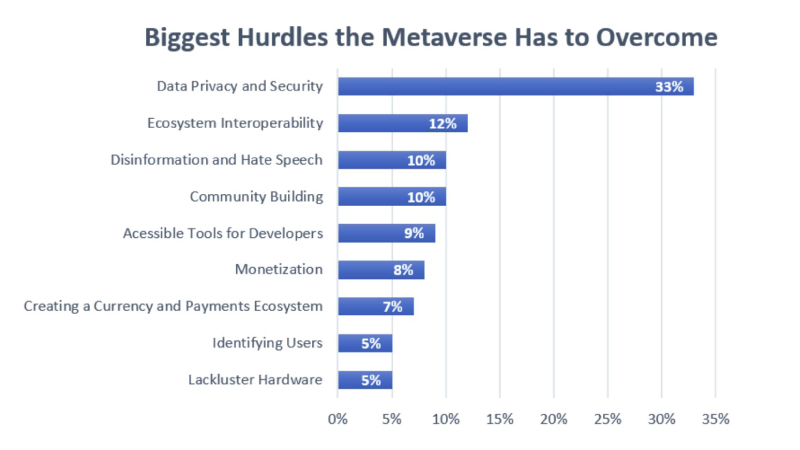Amidst the emergence of the metaverse, which is proving to be a revolution, several hazards to data privacy are emerging
The metaverse has evolved from a concept to a looming reality. An idea that debuted on a science fiction novel is already on the verge of revolutionising how businesses, organisations, and the internet run. While the idea of the metaverse has been met with enthusiasm by tech and marketing giants, it has become a cause for concern for privacy experts. One growing concern that has been constantly discussed is its impact on data privacy and security.
Not so private?
The metaverse that is rapidly becoming a part of our world has long been an essential part of the gaming community. Interaction-based games like Second Life, Pokemon Go, and Minecraft have existed as virtual social interaction platforms. The founder of Second Life, Philip Rosedale, and many other security experts have lately been vocal about Meta’s impact on data privacy. Since the core concept is similar, it is possible to determine the potential data privacy issues apparently within Meta.
Facebook has always been one of the most prominent collectors and hoarders of personal user information, leading to several lawsuits against the company. The company’s business model is based on advertising, using behavioural targeting with surveillance, and collecting personal information. As Meta was promised to be a virtual platform, sold with the idea of allowing users to lead a visual life, the possibility of data collection and surveillance can now likely increase within it.
Metaverse is set to function through next-gen technologies like virtual reality, augmented reality, machine learning, and AI. These behavioural-learning technologies often collect massive amounts of data based on user personal information, threatening privacy. Therefore, using such technologies within the metaverse can become a significant danger to data privacy, considering its parent company’s business model.

The depth of impact
Privacy and security concerns have been an integral part of the metaverse ever since Facebook introduced the idea. Facebook has yet to provide a robust cybersecurity infrastructure designed for the metaverse. A survey by NordVpn recently highlighted people’s concern about the impact of the metaverse on their privacy. Among the surveyed, 50 per cent showed worries about user identity issues, 47 per cent seemed worried about forced surveillance that users go through, and 45 per cent showed concerns about the potential abuse of personal information.
A few of the possible ways the metaverse might impact user data privacy are as follows:
- Phishing attacks: Cyberattacks, especially malicious types like phishing-as-a-service, can be designed in a particular way to steal user information.
- Device targeting: Vulnerable AR/VR devices can become a gateway to malware invasions and data breaches. A problem that is already highly prevalent amongst VR glasses.
- Lack of documents: An absence of legal documentation that protects user identity can also lead to breaches. Hackers can quickly deploy targeted attacks to steal user information with virtual avatars that work through virtual identities.
- Unauthorised data collection: Advertisers can collect user information through users interacting with other avatars and collecting personal data, a case previously evident in the game Second Life.
- Deeper user insight: Since the metaverse is moulding towards mimicking reality, it is likely to collect tons of personal information, including brainwaves, biometric data, health information, preferences and more.
Prevention Methods
Considering that privacy issues today are a significant concern for users, there are a few ways through which organisations or individuals can ensure data privacy and security while interacting with the metaverse:
- Organisations setting up virtual offices within the metaverse should have strict data privacy and security policies regulating the use of personal information. On the other hand, users should beware of the amount of personal information they are willing to share when signing compliance policies.
- Organisations deploying AR/VR devices or platforms should ensure that the risks of hack attacks, data breaches, and other adversarial attacks are strictly being monitored. Such organisations also need to plan ahead of adversarial AI attacks and enable security from them.
- Users must use online security tools to protect from privacy invasions and data breaches. A possible way users should consider while interacting with the metaverse is adopting VPNs, antivirus software, phishing protection, and others.
Data privacy and security have always been a concern for users and organisations worldwide. The rising issue of cyber attacks seems to be a major problem that privacy and security advocates try to mitigate. Amidst the emergence of the metaverse, which is proving to be a revolution in technology, several hazards to data privacy are on the prey. With the major potential, it presents in technological development, it is crucial to address the data privacy and security issue within the metaverse.
If you liked reading this, you might like our other stories
Get Ready For Metaverse
Data Privacy Is A Growing Concern For More Consumers









